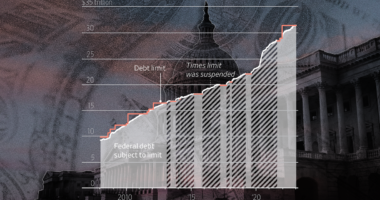
The eurozone’s economy continued to grow at a modest pace in the first three months of the year, but faces the threat of a slide into recession as Russia’s war on Ukraine keeps energy costs high and squeezes household spending power.
Restrictions intended to contain the spread of the Omicron variant of Covid-19 weighed on activity at the start of the year. That burden eased as the quarter progressed and the eurozone economy appeared set for a strong recovery this year.
However, President Vladimir Putin’s late-February invasion of Ukraine has dashed those hopes. Economists say a slowdown in eurozone growth as energy costs surge could become a recession if supplies of gas and oil from Russia are interrupted.
The European Union’s statistics agency Friday said the 19-nation eurozone’s gross domestic product—a broad measure of the goods and services produced by its economy—was 0.2% higher in the first quarter than the final three months of 2021. If that growth rate were sustained over four quarters, the eurozone economy would grow 0.8% over the year. By contrast, the U.S. economy contracted at an annualized rate of 1.4% in the first quarter.
Figures for consumer prices in April also released by Eurostat recorded a pickup in the annual rate of inflation to 7.5% from 7.4% in March. Energy prices fell 3.7% during the month, but were still 38% higher than a year earlier.
That jump in energy costs presents the most serious headwind for the eurozone economy, even as new disruptions in supplies of finished goods and parts from China also creates problems for businesses.
“This surge in energy prices is reducing demand and raising production costs,” said Luis de Guindos, vice president of the European Central Bank, in a speech Thursday.
“The war is also weighing heavily on business and consumer confidence and has created new bottlenecks,” he said. “These developments point to slower growth in the period ahead.”
Responding to the surge in inflation over recent months, the ECB has said it would likely end its program of bond purchases during the three months through September, opening the way for a first increase in its key interest rate since 2011.
Surveys of activity in the weeks since Russia’s Feb. 24 invasion of Ukraine have shown the eurozone economy holding up better than some economists and policy makers had feared.
The Ifo survey of German businesses recorded a rebound in confidence during April after a decline in March, and the EU’s survey of consumers also recorded a partial bounceback. Surveys of purchasing managers conducted by data firm S&P Global also pointed to continued growth and a strong jobs market.
However, the longer the war lasts and energy costs stay high, the greater the risk that growth will fade. Along with most other forecasters, the International Monetary Fund earlier this month lowered its growth forecast for the eurozone this year to 2.8%, from 3.9% when it last published projections in January. It said growth could be weaker in some large eurozone economies, including France, Germany and Italy.
“There is a risk that some of them could enter a technical recession, a mild technical recession,” said Alfred Kammer, head of the IMF’s European department.
A recession would become much more likely if Russia decided to cut its sales of natural gas and oil to eurozone members such as Germany, or if the EU imposed its own embargo on energy imports from the country.
As sanctions stood in April and assuming oil prices averaging around $100 a barrel in 2022, economists at JPMorgan estimated that the eurozone’s energy import bill would amount to almost 600 billion euros, equivalent to $634 billion, this year, an increase over the prepandemic average equivalent to 2.5% of its annual economic output.
But in the event of a halt to Russian imports, they calculate that the bill could rise by a further 2% to 3% of economic output, sharply reducing the amounts that households and businesses had available to spend on goods and services produced in the currency area.
A sudden shutdown of Russian energy supplies could also lead to a decline in the output of industries that have few alternatives.
“If the natural gas supply from Russia were to suddenly stop, it would cause irreversible economic damage,” said Martin Brudermüller, chief executive of German chemicals giant BASF SE.
Speaking to shareholders Friday, Mr. Brudermüller said the company might have to stop production at its Ludwigshafen plant if Russian gas supplies were to end soon.
“To put it plainly, there is no short-term solution to replace natural gas from Russia,” he said. “We will use all options to reduce our dependence on Russian gas as swiftly as possible.”
The EU’s statistics agency didn’t give a breakdown of economic activity in the first quarter, but national agencies did provide some sense of what lay behind the modest rise in activity.
In France and Spain, big declines in consumer spending held back growth during the first quarter, reflecting the impact of Covid-19 restrictions on access to hospitality and other services that require proximity to other people, and pressure on household budgets from rising energy bills. However, in both countries, investment spending and exports continued to increase.
While France’s economy stagnated and Spain’s slowed, Germany’s economy returned to growth after contracting in the final quarter of 2021. By contrast, Italy’s economy contracted in the early months of this year, after growing in the final three months of last year.
Corrections & Amplifications
The U.S. economy contracted at an annualized rate of 1.4% in the first quarter. An earlier version of this article incorrectly said the U.S. economy contracted at an annualized rate of 1.6% in the first quarter. (Corrected on April 29)
Write to Paul Hannon at [email protected]
Copyright ©2022 Dow Jones & Company, Inc. All Rights Reserved. 87990cbe856818d5eddac44c7b1cdeb8








